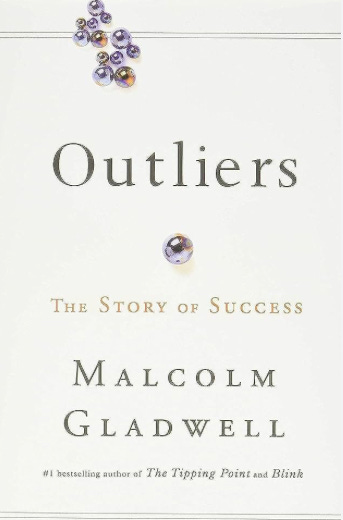No. 171: MALCOLM GLADWELL & CONNOR BEDARD / When the influential social theorist lost his way in "Outliers"
You can get to almost anywhere if you pick and choose your data. How the Beamonesque leaps of logic can pass for insight and win you a devout readership. You too can sound smart for fun & profit.
Connor Bedard: The phenom du jour was laid out last week
ADVISORY: A good chunk of this instalment I published on an obscure website in a significantly different form back in 2009, but the observations and opinions stand and land just as well today. I’ve reworked, updated and expanded where necessary, even adding a footnote or seven.
I took a fair bit of heat on social media about the original story—hey, who was I, a middling sportswriter, the lowest of media lifeforms, to question Malcolm Gladwell? His worshipful readers were outraged and showered me with scorn.
To pre-empt the same playing out again, I offer this brief prefatory advisory:
I’m not saying that Malcolm Gladwell is making up something that’s not there. I’m saying that his reading of data and research led to conclusions that are, if you’re forgiving, incomplete or, if you’re in line with my thinking, missing the most important points. I’m not here to bury Malcolm Gladwell, nor to say “you got it all wrong.” I’m here to say, “yeah, there’s something, but, well, maybe not what you think …”
Look, the fall-out from that original piece caused me such agita that I never even considered revisiting the subject … at least until I started listening to a tremendous podcast series, If Books Could Kill. The IBCK hosts, Michael Hobbes and Peter Shamshiri, give a humorous and critical reading of, as they pithily put it, “the airport bestsellers that captured our hearts and ruined our minds.” Yeah, that captures the spirit of the thing, no doubt. Now in its second season, 24 episodes and highly, highly recommended, if you have a high tolerance for smart, occasionally smug liberals. (If you don’t I don’t know why you’re here.)
Available on Apple Podcasts, Spotify and wherever else you listen.
Well, given the podcast’s subject material, Hobbes and Shamshiri were going to have to work in Gladwell at some point. They waited until Season 1 Episode 2. At that point they tackled The Outliers. As it happens, that’s what I did in 2009.
Casual readers of Gladwell—who among us isn’t at least that—can probably see what’s coming. It’s the hockey-and-birth-month proposition.
Without further ado, here you go:
BACK in the early 90s I had a conversation with Malcolm Gladwell. We had a mutual friend or two who passed along my phone number to him. Gladwell was just establishing his place in the New Yorker’s stable of writers. He asked if I had a spare copy of The Only Ticket off the Island, a book I had written about baseball in the Dominican Republic.1 If the Internet was around then he could have ordered it for chump change. These days it goes ten bucks on Amazon. Hey, it’s getting harder to find. Ten years back, I saw it for a nickel.
I have to suppose that Gladwell was interested in what I wrote about Blue Jays prospects training on the diamond eight hours a day, at least 50 weeks a year, at the complex run by the organization’s chief of scouting in Latin America. (You can get a bit more insight into the dynamic at “El Complejo” if you have a glance at this entry from March of last year: No. 88: EPY GUERRERO / When the baseball scout came in off the road. You’ll need at least a trial sub to access the archive.) Yup, the Jays’ sweat-shop in the DR would have fit right in with Gladwell’s writings a decade later about the “10,000-hour rule,” a theory that’s ever evolving as you’ll pick up here.
In the three decades since he reached out to me, Gladwell has become a publishing sensation. Every new title lands atop the best-sellers lists,:first with The Tipping Pointand then with Blink and on and on. The latest is The Bomber Mafia. He’s considered at the forefront of writers who work the nexus of pop culture, psychology, statistics and, well, you fill in the blank. He has made it his life’s work to debunk the conventional wisdom and rewrite with an unconventional wisdom all his own. If you come across a bit of thinking that’s out of the box, well, it’s likely he took it out and has already put the box out to be recycled.
Gladwell also has become a force on the podcast realm. He launched Revisionist History in 2016 and across its nine-season run it has built up a legion of listeners. That podcast and his podcast production company might seem to command Gladwell’s time an energy to a greater extent than his writing for The New Yorker.
But let’s go back to 2009 and the publication of Outliers: The Story of Success.2 I’m not going to get into what he has written about chess grandmasters, the Beatles, Bill Gates and others who qualify as life’s successes and even geniuses. I’m going to focus on Chapter One.
Junior hockey can’t find its way into major city newspapers in this country but, no matter. The Globe and Mail and the entire CanWest chain can splash the name of the Medicine Hat Tigers across their front pages tomorrow and they won’t reach as many eyes as the latest tome by Malcolm Gladwell. He’s a global brand.
In the opening chapter of Outliers, Gladwell writes about (of all things) the Medicine Hat Tigers team that went to the 2007 Memorial Cup in Vancouver where they lost 3-1 to the host Giants in the final. Vancouver and Medicine Hat were so clearly the two best teams in 2007 that it wasn’t up for discussion.3 I saw at least 70 major junior games that season and the only game better than the Mem Cup final involved the same two teams earlier in the tournament, a contest that the Tigers won 1-0. I can’t remember another 1-0 game that had all in attendance on shpilkis the way that tllt did.4
Gladwell got a lot of his junior hockey stuff right or mostly right.
Keep reading with a 7-day free trial
Subscribe to How to Succeed in Sportswriting (without Really Trying) to keep reading this post and get 7 days of free access to the full post archives.




